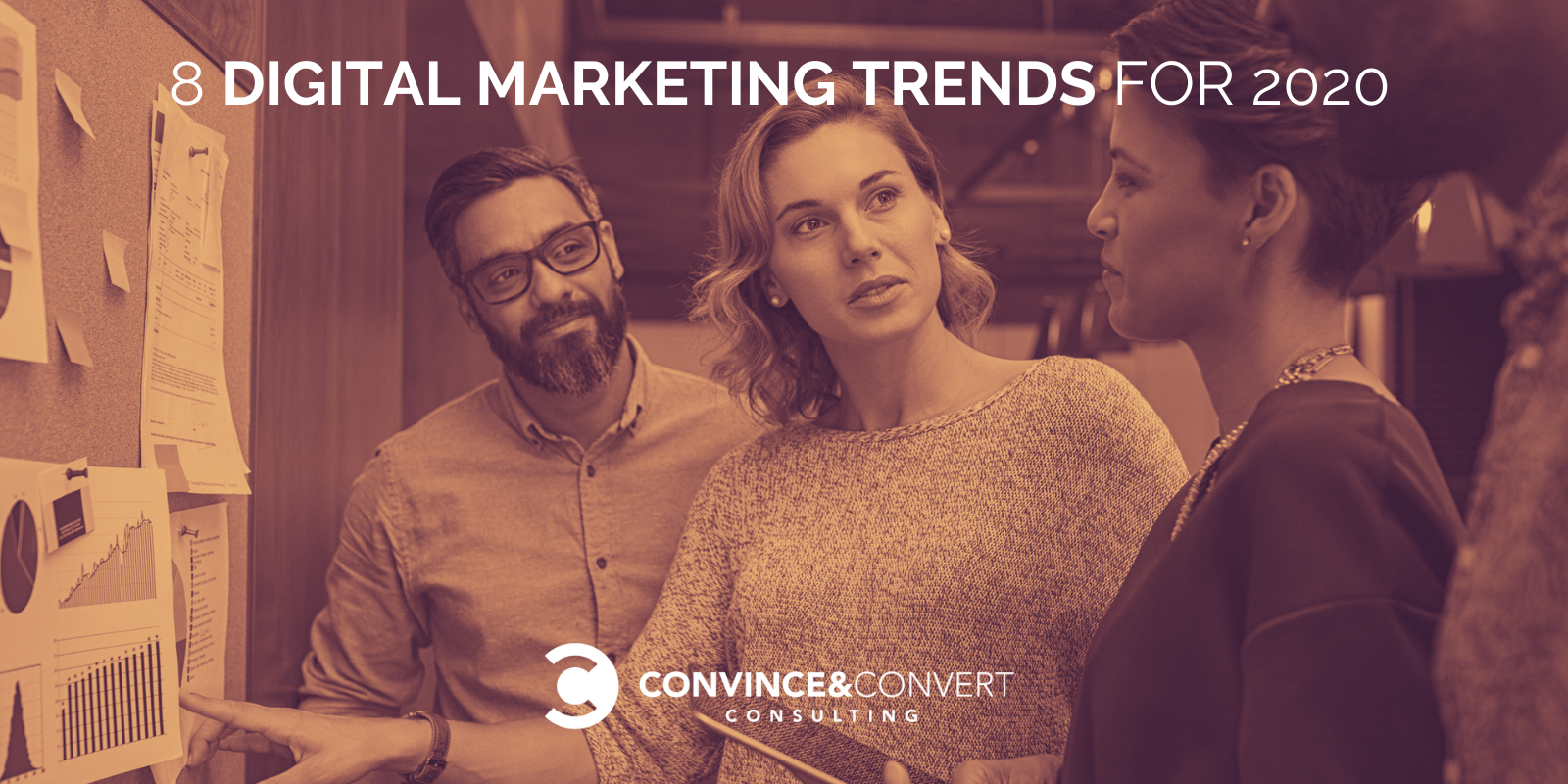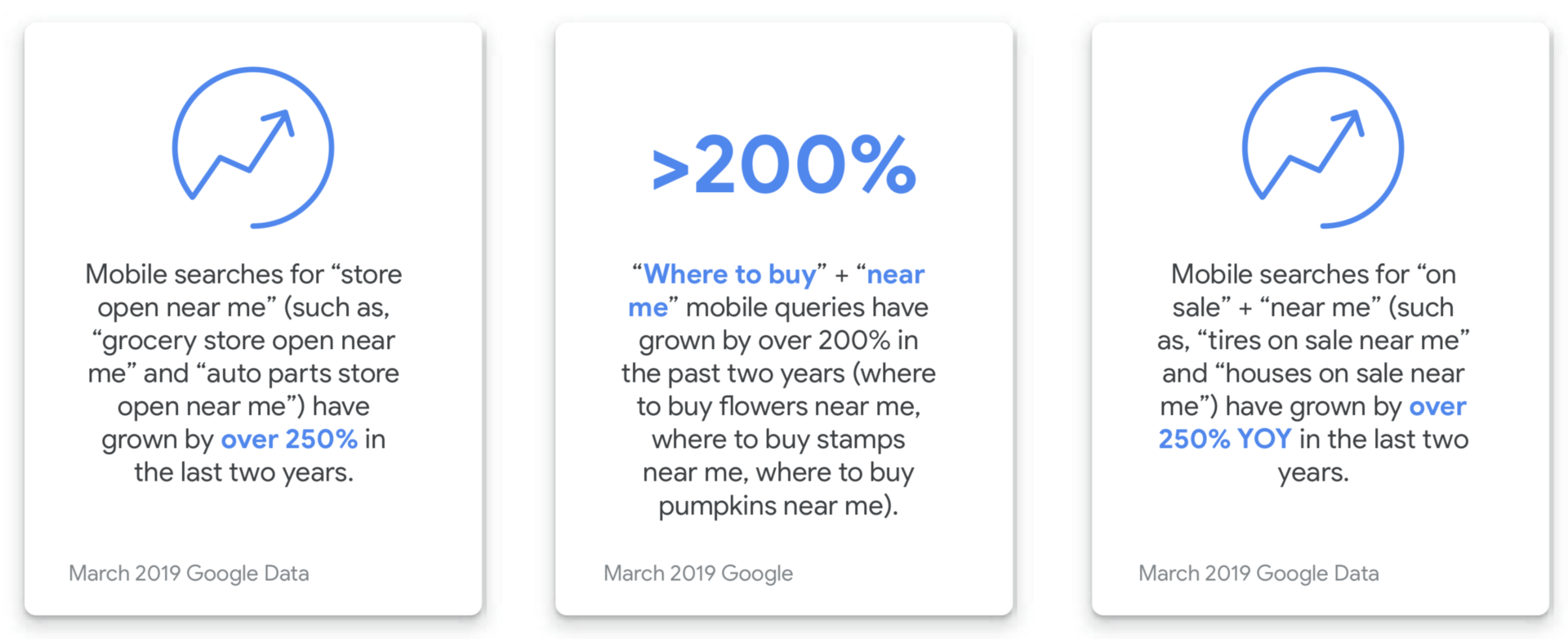
Are you in the midst of planning your 2020 digital marketing?
Here are the biggest digital marketing trends for 2020, according to Convince & Convert’s consulting team.
-
- Messaging Goes Mainstream
- Brands Need to Meet Consumers’ Continued Need for Immediate Information
- Standards Are Being Raised in Privacy and Digital Wellbeing
- Content Inclusivity Across Digital Touchpoints Is Gaining Momentum
- Teams Need to Become Fluent in Interpreting and Collecting Useful Data
- Gathering 1st Party Customer Data Is Becoming Increasingly Important
- Voice-Activated Content Will Increase in Popularity
- The Already Trendy Chatbot Will Get Trendier and Provide Even More Interactive Options
Messaging Goes Mainstream
While email will continue to be an important way for brands to communicate with customers, other modalities will see sharp increases in 2020, especially SMS and Messenger/WhatsApp. While these communication methods are already massively popular in other parts of the world, the United States and Canada will begin to catch up this year, as brands seek to boost open and interaction rates by changing communication vehicles.
The long-standing avoidance of using SMS because it’s “too invasive” is falling away, and the rumored merger or combination of Messenger and WhatsApp into a WeChat-style messaging powerhouse will be the catalysts for this trend. Already, DTC e-commerce brands are taking advantage of these opportunities, and more organizations will quickly follow, given that consumers are signaling willingness (desire, even) to communicate outside of email, and the technology complexity and cost is relatively modest.

Jay Baer, Founder & President
Brands Need to Meet Consumers’ Continued Need for Immediate Information
The internet has given us the amazing ability to gain access to more information and data than ever before. And thanks to our beloved mobile devices, we can get that information anytime we want, no matter where we are or what we’re doing.
Unfortunately for brands, that means they now have to provide immediate information and answers to ever customer question, anytime they want, no matter where they are or what they’re doing. That demand is only going to intensify in 2020, as seen by a recent Google report showing that “best” and “right now” mobile queries have grown by over 125% in the last two years, and “where to buy” and “near me” mobile queries have grown by over 200%.


Anna Hrach, Strategist
Standards Are Being Raised in Privacy and Digital Wellbeing
Last year, people made 2.5 billion visits to their Google account pages where they can view or adjust how their ads are displayed. 1 in 3 Americans have taken steps to improve their digital well-being in the past year and 80% said this had a positive impact of their wellbeing. YouTube has delivered over 1 billion “take a break” reminders since the feature was introduced last year.
In 2019, it became evident that user privacy, trust, and wellbeing go hand in hand with effective advertising. To be successful, marketers need to work to win people’s trust by raising industry standards and providing more tools and insights to help them manage their digital wellbeing.

Anthony Helmstetter, Strategist
Content Inclusivity Across Digital Touchpoints Is Gaining Momentum
Making the web more inclusive and accessible is gaining momentum. Updated Web Content Accessibility Guidelines released in 2018 started to get real traction in the past year as web developers, and UX designers began to move away from the “one-size-fits-all” mindset that has been pervasive until recently.
The WCAG standards are structured in four principles: Perceivable, Operable, Understandable, and Robust, and a framework that includes 13 guidelines that fall within these principles. Though not explicitly, these guidelines are moving beyond websites to include additional content types, including the videos and graphics most commonly found on social media. Adding captions on all video and descriptive captions as alt-text for images is already becoming commonplace for social media content creators — yet there are more steps to include for creating and publishing new social content that will be inclusive and accessible.
More than 285 million people in the world have visual impairments, and in 2018, Instagram made improvements to make it easier for people with impairments to use the platform. Creating all content, whether on websites, email, social media and voice, to WCAG standards helps makes content more accessible to a wide range of people with disabilities. It also helps the older generations (and truly, everyone) by making content more usable.

Lauren Teague, Strategist
Teams Need to Become Fluent in Interpreting and Collecting Useful Data
As we continue to move towards a more trackable and more measurable digital marketing environment, marketing teams have the opportunity to learn, understand, and predict the behaviors of their audiences more accurately than ever. 81% of marketers expect the majority of their decisions will be data-driven by 2020, according to Gartner’s 2018 Marketing Analytics Survey. The disconnect is that many teams have found their skillsets misaligned with this new reality over the last several years.
As we move into 2020, the reality is that it is no longer optional for marketing teams to be good at understanding data. It is absolutely vital that all marketing teams become well-versed in data storytelling and interpretation.

Zontee Hou, Co-lead, Consulting
Gathering 1st Party Customer Data Is Becoming Increasingly Important
As Europe’s General Data Protection has given way to more Internet privacy regulation like the California Consumer Privacy Act, brands will need to put even more emphasis on collecting and utilizing customers’ first-party data.
The paradigm has started to shift in the last couple of years as until recently, third-party data (for example, data like your credit card purchases that come from a data aggregator like a DMP), was highly utilized both for media targeting and other marketing executions.
Privacy regulation is now increasingly forcing brands to put a greater emphasis on first-party data acquisition and utilization — which is not only a must but is good for business and for the consumer.
In fact, according to a March survey of digital buyers in North America conducted by Vision Critical, 80.1% of respondents said they would be comfortable sharing personal information directly with a brand for the purposes of personalizing marketing messages. But just 16.7% said they would be OK with sharing this type of information through third parties.

Mary Nice, Co-lead, Consulting
Voice-Activated Content Will Increase in Popularity
Voice is the new interface that will soon surround us in many places and in many ways. Voice content for Amazon Echo, Google Home, and Samsung devices is being developed by brands large and small.
We’re building voice-activated content strategies for our clients here at Convince & Convert — helping them take advantage of this fast-growing consumer interaction opportunity (for more on what we do in voice content, see Why The Time is Now for Voice-Activated Content).
Voice-activated content via smart speakers and other devices is an early-stage, emerging field. Yet, the rapid adoption of these devices suggests that voice will continue to grow as an interaction ecosystem.

Jenny Magic, Strategist
The Already Trendy Chatbot Will Get Trendier and Provide Even More Interactive Options
According to Salesforce’s “State of the Connected Consumer” report in 2019, 77% of customers say chatbots will transform their expectations of companies in the next five years.
Their usage has already begun to explode and the depth of interactivity within them will follow suit. Consumers will welcome being able to use their voice to talk with chat bots versus typing alone, and those who really want to get their message across using video will find they’ll have that option as well. Here’s a great example of this technology already in use.

Chris Anderson, Partnerships and Digital Strategy
The post 8 Digital Marketing Trends for 2020 appeared first on Convince and Convert: Social Media Consulting and Content Marketing Consulting.
from Convince and Convert: Social Media Consulting and Content Marketing Consulting https://ift.tt/340BmEp

No comments:
Post a Comment